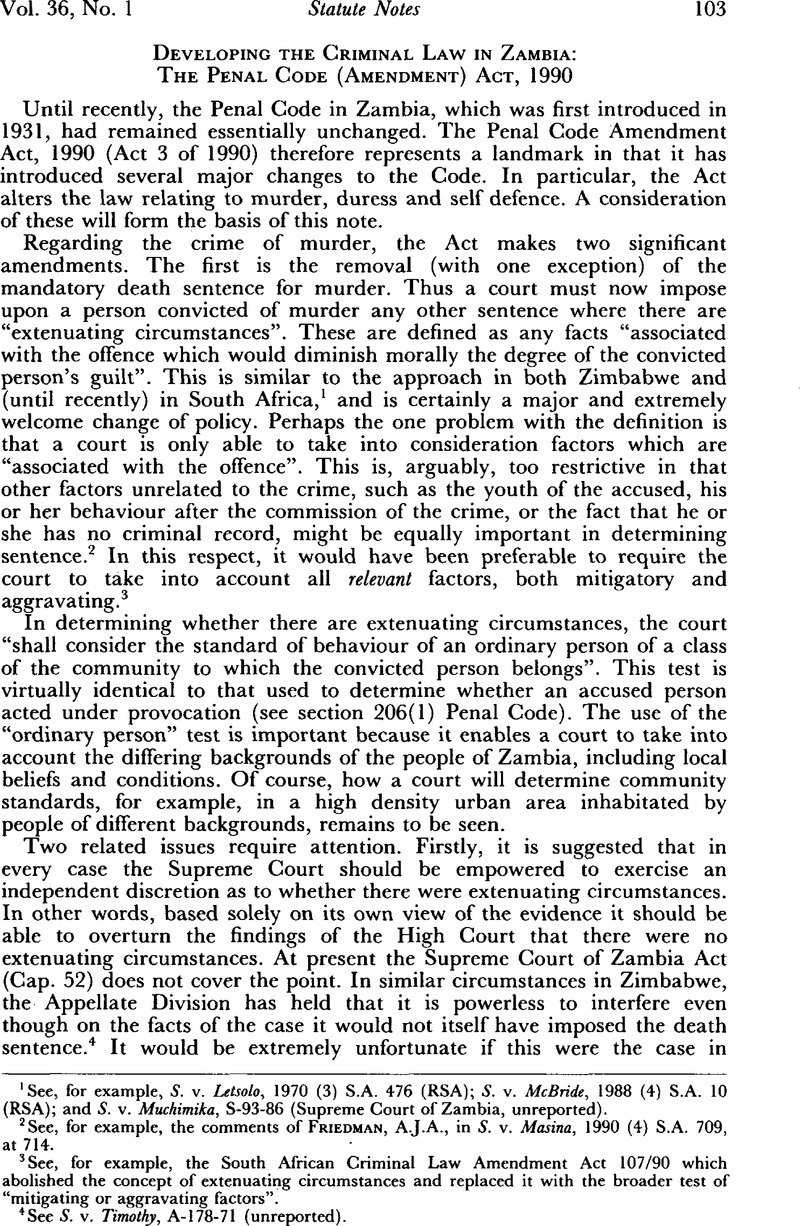Published online by Cambridge University Press: 28 July 2009

1 See, for example, S. v. Letsolo, 1970 (3) S.A. 476 (RSA)Google Scholar; S. v. McBride, 1988 (4) S.A. 10 (RSA)Google Scholar; and S. v. Muchimika, S–93–86 (Supreme Court of Zambia, unreported).
2 See, for example, the comments of Friedman, A.J.A., in S. v. Masina, 1990 (4) S.A. 709, at 714Google Scholar.
3 See, for example, the South African Criminal Law Amendment Act 107/90 which abolished the concept of extenuating circumstances and replaced it with the broader test of “mitigating or aggravating factors”.
4 See S. v. Timothy, A–178–71 (unreported).
5 Cf. the Criminal Law Amendment Act 107/90 in South Africa which provides that if the Appellate Court is of the opinion that it would not itself have imposed the death sentence, it may impose “such other punishment as it considers to be proper”.
6 See S. v. Nkwanyaya, 1990 (4) S.A. 735Google Scholar.
7 See, for example, Hatchard, J., “Crime and penal policy in Zambia” (1985) 23 Journal of Modern African Studies, 486–488CrossRefGoogle Scholar.
8 Williams, Glanville, Textbook of Criminal Law, London, 1978, 624Google Scholar.
9 Report of the Committee on Mentally Abnormal Offenders Cmnd 6244 (U.K.)Google Scholar.
10 14th Report, Cmnd 7844.
11 Zambia has already had an unfortunate experience in this respect with the introduction in 1972 of s.16 of the English Theft Act, 1968. Prior to this, part of the section was described by Davies, J., in the English case of Royle, [1971] 3Google Scholar All E.R. 1359 as a “judicial nightmare”. The offending part was later repealed and replaced in England but the provision remains extant in Zambia.
12 It is not clear why the word “coercion” was included as it appears to add nothing to the section.
13 See the similar views of Smith, J., in Hurley and Murray, [1967] V.R. 526, at 543Google Scholar.
14 See Hatchard, J. and Ndulo, M., Readings on Crime and Criminology in Zambia, London, 1992, 71–72Google Scholar.
15 Cf. ss. 223 and 282 of the Nigerian Criminal Code which use the term “reasonably necessary”.
16 One approach would be to follow the case of City and South London Railway v. LCC, [1891] 2 Q.B. 513Google Scholar, where [necessary” was held to mean “necessary in the honest and bona fide judgment of the undertaker”.
17 S. 235 of the Penal Code states that a person authorised by law to use force is criminally liable for any excess, but it gives no indication as to what the effect of the use of excessive force will be in any particular case.
18 See McInnes, [1971] 3 All E.R. 295Google Scholar.
19 18 E.A.C.A. 164.
20 [1962] R. & N. 157Google Scholar.
21 See Mulenga, [1966] Z.R. 118Google Scholar and Njovu, [1968] Z.R. 132Google Scholar.
22 See, for example, The People v. Lewis, [1975] Z.R. 43Google Scholar and Tembo v. The People, S.C.Z. Judgment No. 1 of 1980 (unreported)Google Scholar.
23 Interestingly, the report did not examine the issue of diminished responsibility.